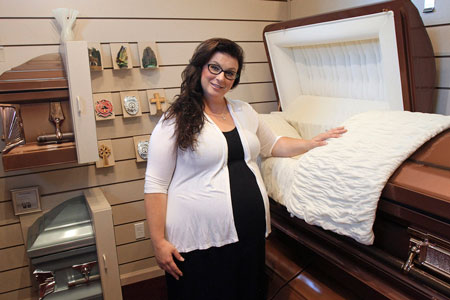For generations, funeral homes have been passed down from father to son.
“Now, they are being passed on more and more from father to daughter,” said Valerie Wages, president of Tom M. Wages Funeral Service in Lawrenceville and Snellville, Ga., founded by her father.
Wages, a former teacher who decided to work in her father’s funeral home, is an example of a growing trend, said Jessica Koth, public relations manager for the National Funeral Directors Association, Brookfield, Wisc.
In the past decade, she said, surveys show that a growing percentage of their members are women. For example, the percentage of women attending mortuary science school increased from 35 percent to 57.1 per- cent from 1995 to 2010.
“When I was in mortuary school, it was about 1 percent women,” said Jacquelyn Taylor, senior scholar at the New England Institute at Mount Ida College just outside Boston. Taylor, a veteran of the funeral directors’ profession, has seen the steady influx of women in this career.
“I was a psychology major in college,” said Beth Dalton-Costello, president and co-owner of Dalton Funeral Homes on Long Island. Her grandfather founded the business. “I was always interested in helping people,” and worked in several jobs before being drawn to the family business.
“Being a funeral director is a helping profession,” she said. “I enjoy it. I’ve been doing it more than 30 years.”
Wages noted that “it’s not just daughters of funeral home directors that are coming into the business.” She said nurses, former hospice workers and others have joined the profession.
Taylor said she became interested in this line of work when she growing up in Oregon. “My family’s church was next door to a funeral home,” she said.
One day, Taylor said, she was curious and knocked on the door and asked to speak to the funeral home director. That conversation led to a tour of the funeral home for her parish youth group. Over the years she was impressed with the dedication of funeral directors serving families and considered it for her own career.
When Wages was growing up she said she saw her father “getting calls in the middle of the night or on Christmas Day” following the death of a loved one. She found her father’s commitment inspiring.
“I see it as a ministry,” Wages, a Southern Baptist, said. “You are meet- ing people at the lowest point in their lives.” Treating them with compassion is essential. “Over the years I’ve been happy to hear so many people say: ‘You really listened to me.’”
“It is a difficult time in people’s lives,” Dalton-Costello said. “You can’t remove the pain and grief, but you can help them gain order and control.”
She added, “I think women bring a certain energy to the profession. Sensitivity and compassion reflect the nurturing side of women.”


I believe that Funeral directors, be it male or female, are doing great work by providing support during the weakest moments of a person. Funeral planning is not easy. You have to control your emotions and also take care of the one bereaved. It is indeed true that female funeral directors are growing in number and can offer good support especially to males. But ultimately, all funeral directors are definitely doing a great job for the mankind. http://www.unityfunerals.com.au/prepaid-funerals-sydney/